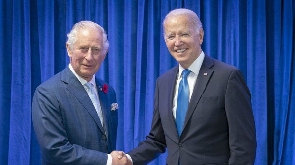Di United States and di United Kingdom don enjoy wetin Winston Churchill call “special relationship” - yet no US president don eva attend royal coronation.
Dis tradition na sake of say di two nations no like each oda? Or na sometin else?
Di Coronation of King Charles go mark centuries of pageantry and tradition.
Di King go swear im oath for Westminster Abbey in front of thousands of im subjects and heads of state.
But e go show say one pesin no come among di many dignitaries wey go show face: US President Joe Biden.
Di White House tell di BBC say dem invite Joe Biden to di coronation. But for one phone call wit di King, di president tok say im go send im wife, First Lady Jill Biden, and one diplomatic envoy, instead.
Di White House no give reason why Oga Biden no go attend, but dem tok say di President don “convey im desire to meet wit di King for di United Kingdom for future”. Di no-show don cause tok-tok.
Russell Myers wey be royal editor for di Mirror newspaper tell Sky News say di president absence na sake of im dey “very proud of im Irish roots, im Irish American roots”.
"I no tink say na real possibility say im go come," Oga Myers tok.
But historians tok say di reason dey less political, and na sake of say na tradition wey don dey for centuries for American presidents to miss di coronation.
‘No be snub’
“I no view am as snub on President Biden part,” Laura Beers wey be professor of history for American University tok. Beers specialise for modern Britain.
“Na non-story in terms of di idea say Biden na anti-British,” she tok. “Im no dey go sake of say no American president don eva go to coronation, so why im go start am for di 21st century."
Before di reign of Queen Victoria, Ms Beers note say di US-UK relationship na dat of enemies, afta di America Revolution and di War wey shele for 1812.
Queen Victoria accession to di throne cause wetin dem term Victoria Fever and Americans dey fascinated by di British monarchy, but even di den President Martin Van Buren no attend di ceremony.
“E no dey practical for American President to come, and I tink e just become tradition afta dat,” Ms Beers tok.
Troy Bickham wey be historian and fellow wit di Royal Historical Society tok say travelling overseas no dey practical before transatlantic air travel begin for 1939, three years after di coronation of King George VI.
Eisenhower and Elizabeth
Di Second World War mark turning point for di diplomatic relationship between di Untied States and di United Kingdom, according to historians.
Throughout di war, King George VI and im daughter, den-Princess Elizabeth, develop relationship wit Dwight D Eisenhower wey serve for London as di Supreme Commander of Allied Forces and supervise “Operation Overlord”, wey be di D-Day invasion of Normandy.
Dem elect oga Eisenhower as di 34th President of di United States just months afta King George VI die and Queen Elizabeth II ascend di throne.
But despite im close ties to di UK, Oga Eisenhower choose to keep to tradition and send one envoy to di coronation instead.
Historian Sam Edwards note say di US was dey in di middle of di Korean War during dat time, and dem go also need President Eisenhower for Washington.
One queen, 14 presidents
As Britain longest reigning monarch, Queen Elizabeth II rule through 14 US presidencies, and meet all of dem except one president during dia tenure for office. Three sitting US presidents don make official state visits to di UK, while di Queen make four state visits to di US during her reign.
While im appear to keep di tradition by sending one envoy to di coronation, President Biden don already accept one invitation from King Charles for one state visit. Dem neva set date.
No mata di pesin wey attend di coronation, Oga Edwards say King Charles presides ova one renewed commitment to di diplomatic relationship between di two kontris.
E tok say attending di coronation “na one piece of di contemporary transatlantic relationship puzzle"
BBC Pidgin of Thursday, 4 May 2023
Source: BBC




















